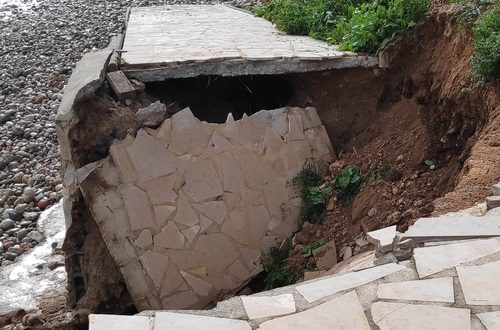
The coronavirus lockdown in Spain
Since March the coronavirus hit Spain hard. Spain is actually one of the worst hit countries in the world. At the height of the crisis Spanish TV was showing hospitals completely overrun by patients, with people on chairs in corridors and even laying on the floor. Currently Spain has 222.857 confirmed cases (Spanish). The only country with more confirmed cases is the USA. However, because of Spain’s lower population, the amount of confirmed cases per 1.000.000 inhabitants is much higher compared to the USA. It has been so bad that the public hospitals couldn’t handle the situation. Because of this, Spain has temporarily nationalized all the private clinics and hospitals to make these available to everyone. Across the entire country hotels have been turned into temporary hospitals. For example hotel RH Vinaros Playa (Spanish), in the city we live in, is functioning as a temporary hospital. Thanks to this there are currently 322 extra hospital beds available in the region. There are also 30 hotel rooms which can be used by medical personnel, to prevent that they will infect their families.
Like in basically every country, there is a large awareness campaign going on to keep people inside their homes. On social media the main campaign can be found under the hashtag #quedateencasa, stay home. There is a second, smaller campaign, named Mascarilla-19, focused on home violence.
Within Spain itself there are big differences in between regions. When you take a glance at the map (Spanish) you instantly notice that the amount of infections is lower in the warmer, coastal regions on the south and the east of the country. Which is odd since one of the first reported cases were on the Canary Islands and in Valencia on the eastern coast. On the Canary Islands it was imported by tourists. In Valencia many supporters, players and staff of Valencia CF brought the virus home after being infected during a Champions League match in Milan against Atalanta. A club from Bergamo, which is Italy’s worst hit city. Despite this the virus didn’t spread as rapidly as it did in Madrid or La Rioja, a region well-known for its wines. So it seems that the virus spreads faster at lower temperatures (Spanish).
Despite the lower amount of infections in our region, the measures of the lockdown are the same as anywhere else in the country. This means that restaurants and hotels have been closed and people are only allowed on the street in case they need medical help, need to do groceries or have to go to their work. Since last week the government did decide to let young children outside under the supervision of an adult for half an hour daily, after they were pressured by people concerned with the mental health and development of young children. Since last Saturday it’s also allowed for adults to go for a walk on certain times. The time at which you are allowed outside depends on your age. We are allowed to go outside within a radius of 1 kilometer of our home in between 6:00 and 10:00 in the morning and 20:00 and 23:00 in the evening.
The measures are being enforced by the police, guardia civil and the army. In Spain they are not the type of softies which you can fool and push around. If you try to outsmart them it will cost you dearly. For example, you are allowed to do groceries, but you should limit it as much as possible. Someone from Elche who decided to go on a walk to the supermarket to buy a jar of Nocilla, a hazelnut and chocolate paste, received a fine of 2.000 euro. In case this person pays the fine within 14 days, he or she will get a 50% discount. But even with such a discount, a 1.000 euro jar of Nocilla is probably still the most expensive Nocilla ever (Spanish).
The government is not only busy enforcing the lockdown measures, but is also working hard to disinfect public areas (Valencian/Catalan). Teams of people in protective suits and masks spray benches, trash bins, entire streets with disinfectants. Even in the gated “urbanización”, in which we live, the walkways and benches are regularly disinfected, all the way up to our front door.
Our current situation
At the moment we can’t work or even look for a job. We have also minimized doing groceries to once every 2.5 weeks and only go to the hypermarkets. These are big supermarkets just out of town, which have wider aisles. We stopped doing groceries together, since only one person is allowed to be in a supermarket or even in a car. At the entrance of the supermarket a guard is waiting for you to disinfect your hands and put on gloves. Stripes on the floor tell how much distance you should keep from each other. A piece of Plexiglas shields the cashier from the client. And, even though it’s not obligatory yet, almost everyone is wearing a mask.
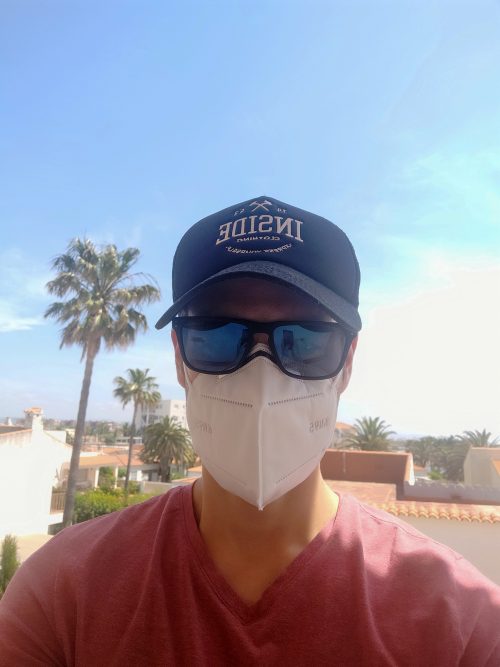
The remaining time we spend inside our home, a tiny 30 square meter studio. One room, a bathroom and a balcony. We know tiny living and tiny houses have been a hype during the last years, but believe us. When you can’t go outside because of a lockdown, 30 square meters are not enough. To make matters worse, our internet and even our electricity have, again, not been stable. While Spain is known for being the sunniest country in Europe, it hasn’t been living up to its name during the last month. We have had several heavy rains, which caused flooding in our region. Not just once, but twice. We kept it dry because our apartment is built on a cliff that is a bit higher than the surrounding area. But the bad weather did break our internet a few times for several days. For some short moments even the electricity went off. So we were really confined to our small studio apartment, without much contact with the outside world. To spend time we have been baking a lot of pancakes, buns, a pizza and many other things during the last few weeks. I’ve also been planting seeds, a bit too many perhaps. Our balcony currently looks like a forest of tomato, basil, leek, potato and sweet potato plants. And even though I don’t like reading books at all, I started reading the only book we had laying around. Stephen King’s The Stand, about a highly contagious virus that kills almost everyone. Let’s just hope that stays fiction, it’s bad enough as it is!
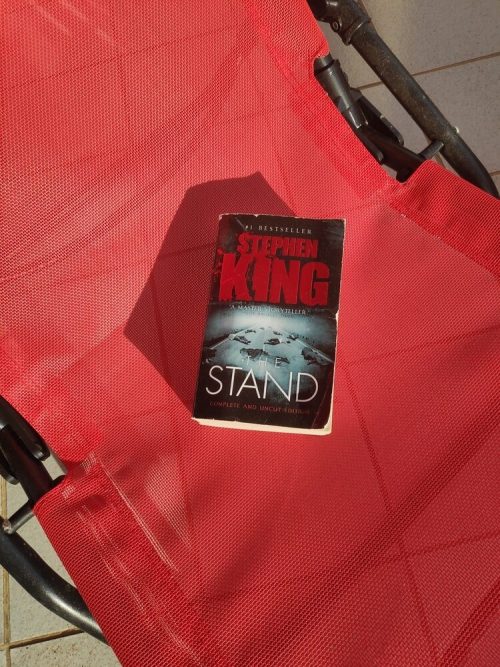
Our family abroad
Despite the higher amounts of confirmed cases in Spain, we actually worry more about our families abroad. We have family both in The Netherlands and Poland. The amount of cases in these countries seem to be lower, but the amount of tests being conducted is also a lot lower. Almost every country at the moment has excess deaths compared to normal. If you don’t test enough, then you won’t have many Coronavirus deaths, but people will still be dying from it.
We also worry that the measures being taken in these countries are too lax. My grandmother is living in an apartment for elderly people where she receives care. Despite the fact that people at high risk live there, they are not shielded from danger. Nurses that help at the apartment complex also take care of people outside of the elderly home. To make matters worse, they have basically no protection at all. And even visits are allowed. Yes, visitors have to disinfect their hands prior to entry, but not much more is done. I’m better protected during my visit to the supermarket.
Instead of running from danger, Maja’s mother is fighting on the frontlines. She is working as a nurse in a hospital in Rotterdam, which has been turned into the regional corona center. The only patients she has are patients with the coronavirus and several of her colleagues have already been infected. The girlfriend of Maja’s father also works in healthcare, as a hospice in Poland, so she and Maja’s father also have a higher risk of catching it…
The good thing is that both Poland and The Netherlands had a relatively warm and sunny spring, which probably helped in reducing the spread of the virus. We in Spain had the exact opposite.
Light at the end of the tunnel
The good news is that it slowly seems to get better at the moment. Thanks to the lockdown, which reduces transmissions, the amount of people that need to go to the hospital for treatment is going down. We wonder if the virus will disappear during the coming weeks, since people are still being infected, while preventive measures are already being reduced.
So how about those sunny, summer holidays in Spain? At the moment it’s still unknown if it will be possible to spend your summer in Spain. Spain hopes to get back to normal at the end of June, but this does not mean that tourism will be back to normal by then. From what it looks like right now, hotels will only open for Spanish residents at first. Although this has not officially been confirmed.
Anyway, the sun started shining again and the temperature made it feel like summer during the last few days. So even though a virus may not technically be alive, hopefully that will kill it.
For now, good luck and health to all!

You May Also Like
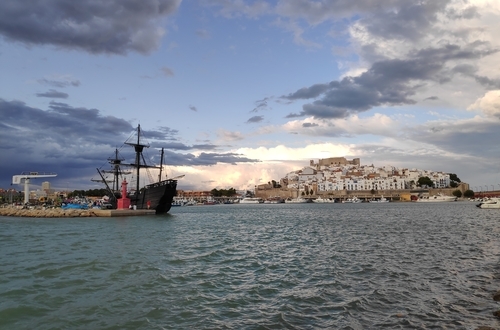
Last summer
11 November 2019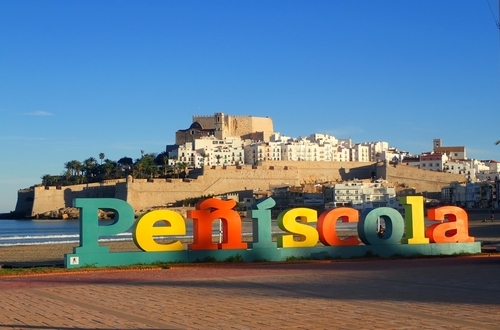
Our first post!
12 January 2019